Palestine Broadcasting Service (PBS), Public Diplomacy (PD) and Theater
There were at least six significant theatre groups that the PBS kept a close eye on: "Habima", "Ohel"; "Matateh"; and "Li-La-Lo"; The fifth theater was just coming of age in 1946, the "Cameri Theater" established in 1944; and the sixth theatre group that should also get a mention, the Jerusalem Dramatic Society; but there was also another set of theatres that the PBS was particularly interested in: Children's theatre. You could say the PBS had a symbiotic relationship with the children theater, to influence and in some ways to exploit (in a nice way, that is). At a practical level the PBS needed a supply of radio voices suitable for broadcasting from the news to all kinds of educational and cultural programs, in Hebrew, English, and Arabic too.There is no question that the Habima theatre then was a major actor (pun intended) in Mandatory Palestine's theatre world and so found itself in the cross-hairs of the British Authorities in general and Palestine Broadcasting Service in particular from the outset.
As a rule, there was also suspicions that performances could be used for propaganda, to undermine the British authorities. "Matateh" and "Li-La-Lo" were uniquely placed for this as they were both known for putting on satirical theatre. One way would to possibly counteract this would be to map out a Who's Who and What's What in the theatre world: production and office staff; the actors; the repertoire (the plays); and the audience, itself. Into each they could inject a little assistance in helping the development of local theatre align with British, American and western culture in general. Make them dependent on their patronage.
Mapping out this who's who and what's what in Habima, was relatively straight forward. Hanna Rovina, Habima's leading actress as well known to the PBS. She had participated at the inauguration of the Palestine Broadcasting Service back on that windy Monday, March 30 1936, where she performed a short extract from
In this audio Rovina is introduced by Hemda Feigenbaum from PBS. While this recording was probably not the original one of 1936, but one made in 1946, broadcast on the tenth anniversary of the PBS, we at least get an idea of what it sounded like at the time.
The following year, 1937, Habima was invited to London to perform the Dybbuk for the BBC Television!
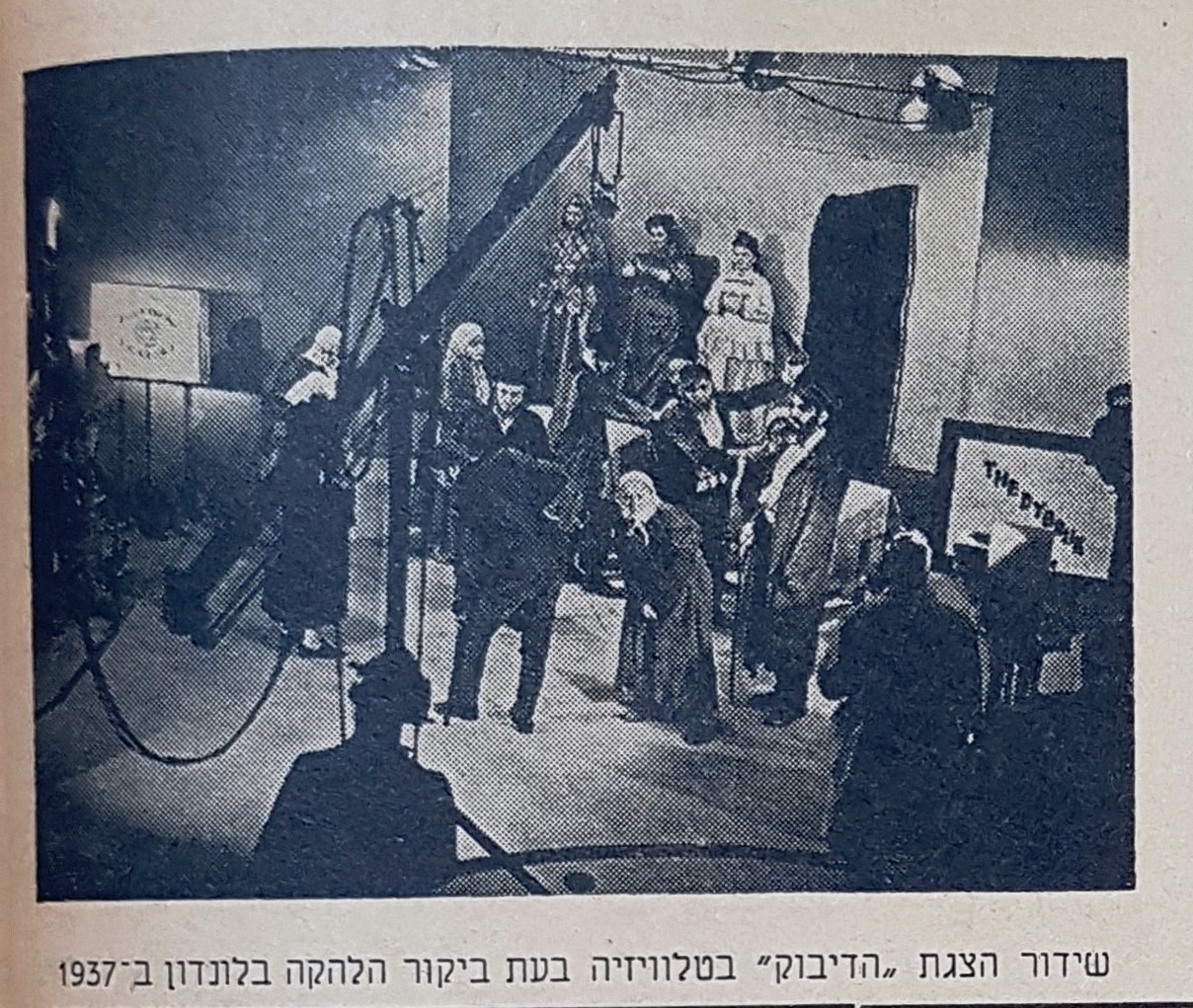
|
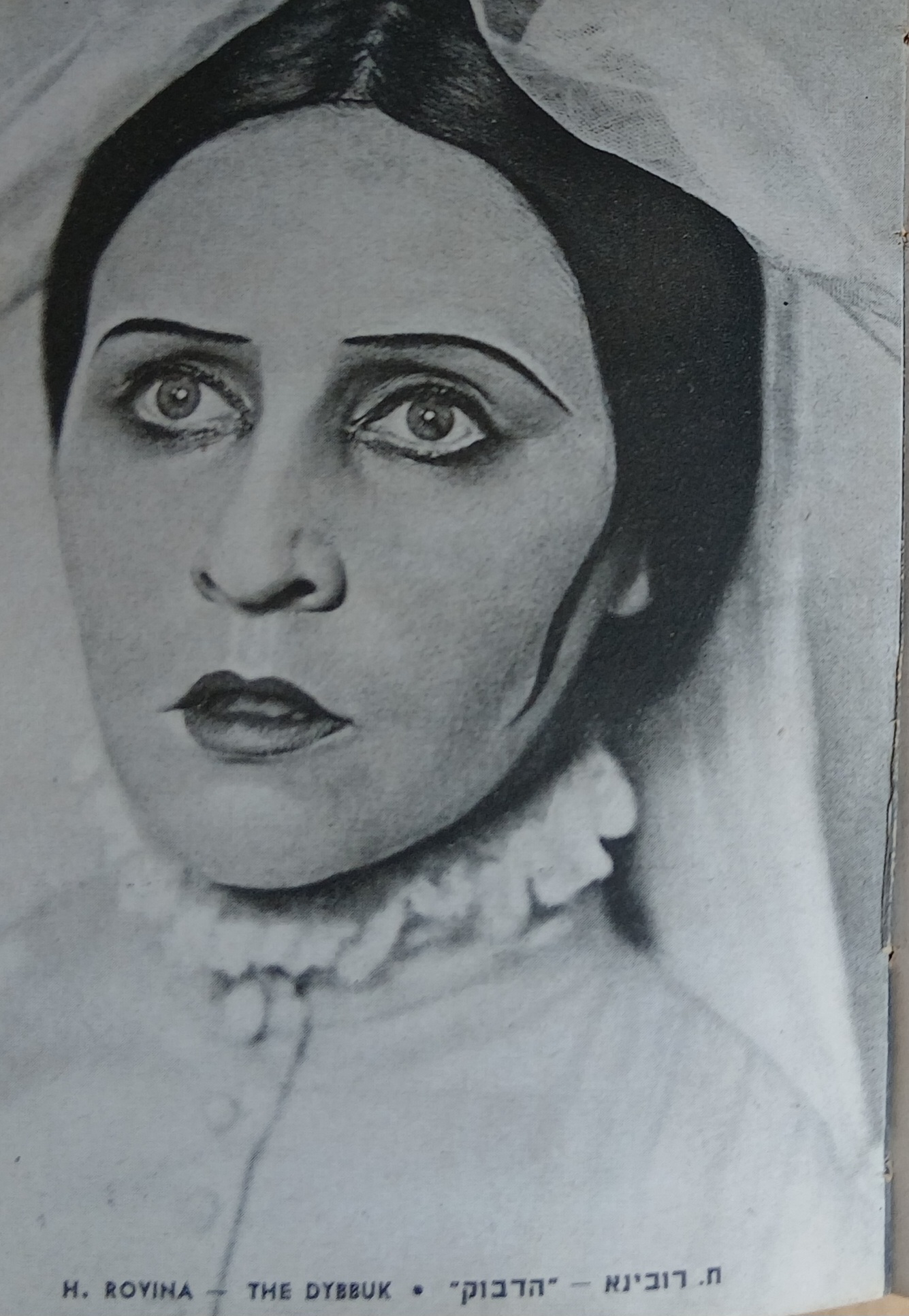
|
| Photo at the set of Dybbuk, BBC Television Studio, London, 1937 | Hanna Rovina in starring role in Habima's "Dybbuk" |
Habima was clearly being followed closely by Arthur Wauchope, British High Commissioner, when he wrote a letter to Hanna Rovina, dated 10th June 1937, expressing his sorrow at a fatal car crash that had taken the life of one of Habima's up and coming actors, Jacob Avital (see photo), when Habima was on the road traveling up north, in the Galilee, near Tiberias, for a performance:
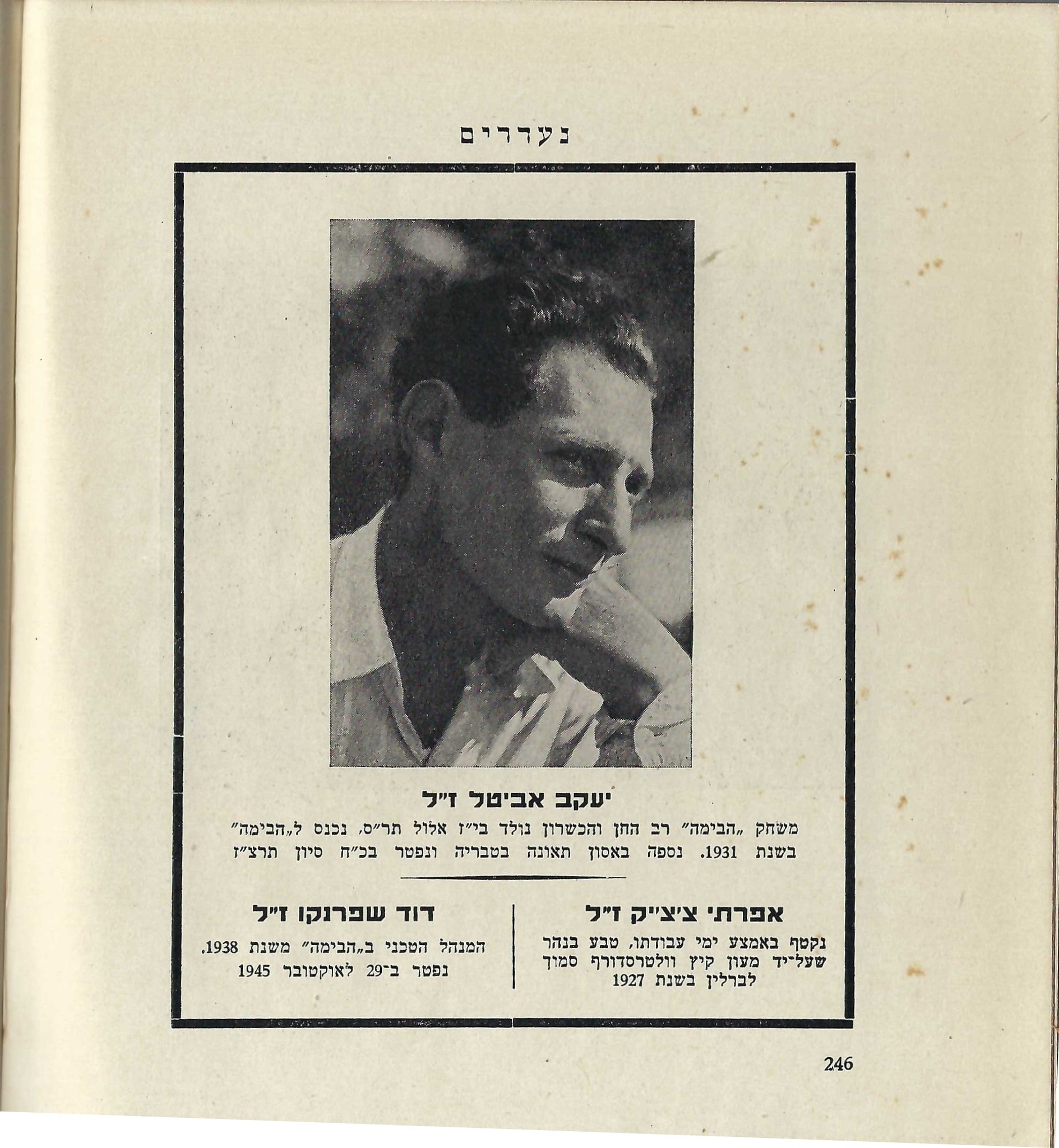
|
| Jacob Avital, from book "Habima at 25", by Gershon Hanoch, p 246, 1946 |
Government House, Jerusalem
10th June 1937
Dear Mrs Rovina,
I am writing to express to you my deep sorrow at the death of a member of your company, Jacob Avital, following a motor accident near Tiberias. It is indeed sad that so promising a young actor should be killed and I am sure you all feel his loss deeply.
I trust that the remaining people injured in the accident are now safely out of danger and I am glad that you yourself have escaped unharmed.
Yours very sincerely,
Arthur Wauchope
In May 1944, Hanna Rovina, traveled to Egypt to entertain the Auxiliary Territorial Service (ATS), the woman's branch of the British Army (Jewish Brigade). See photos of Hanna Rovina in Egypt with the troops and her welcome back ceremony, with Moshe Smilansky (MBE) and Dr. Moshe Krieger, among others.
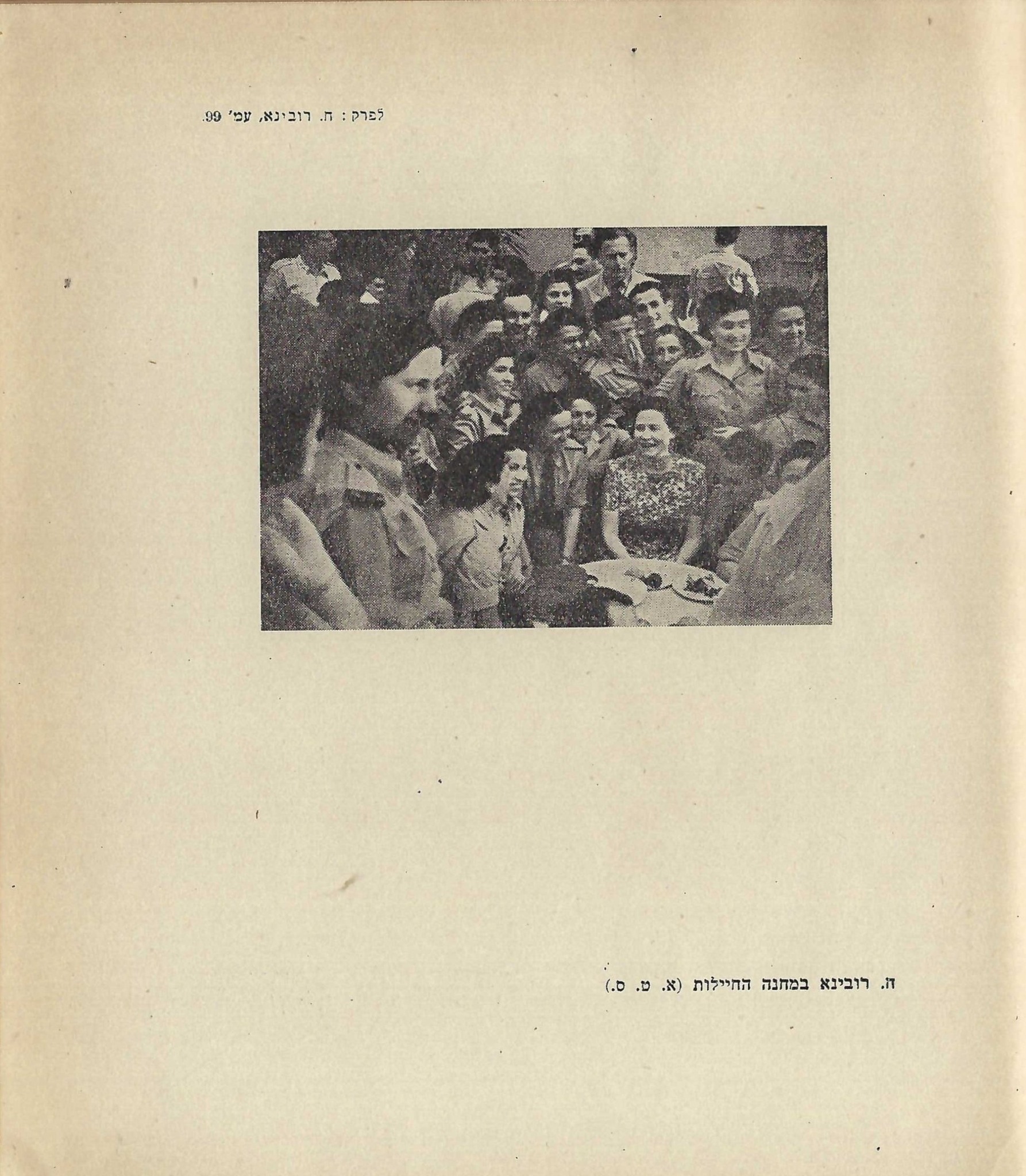
|
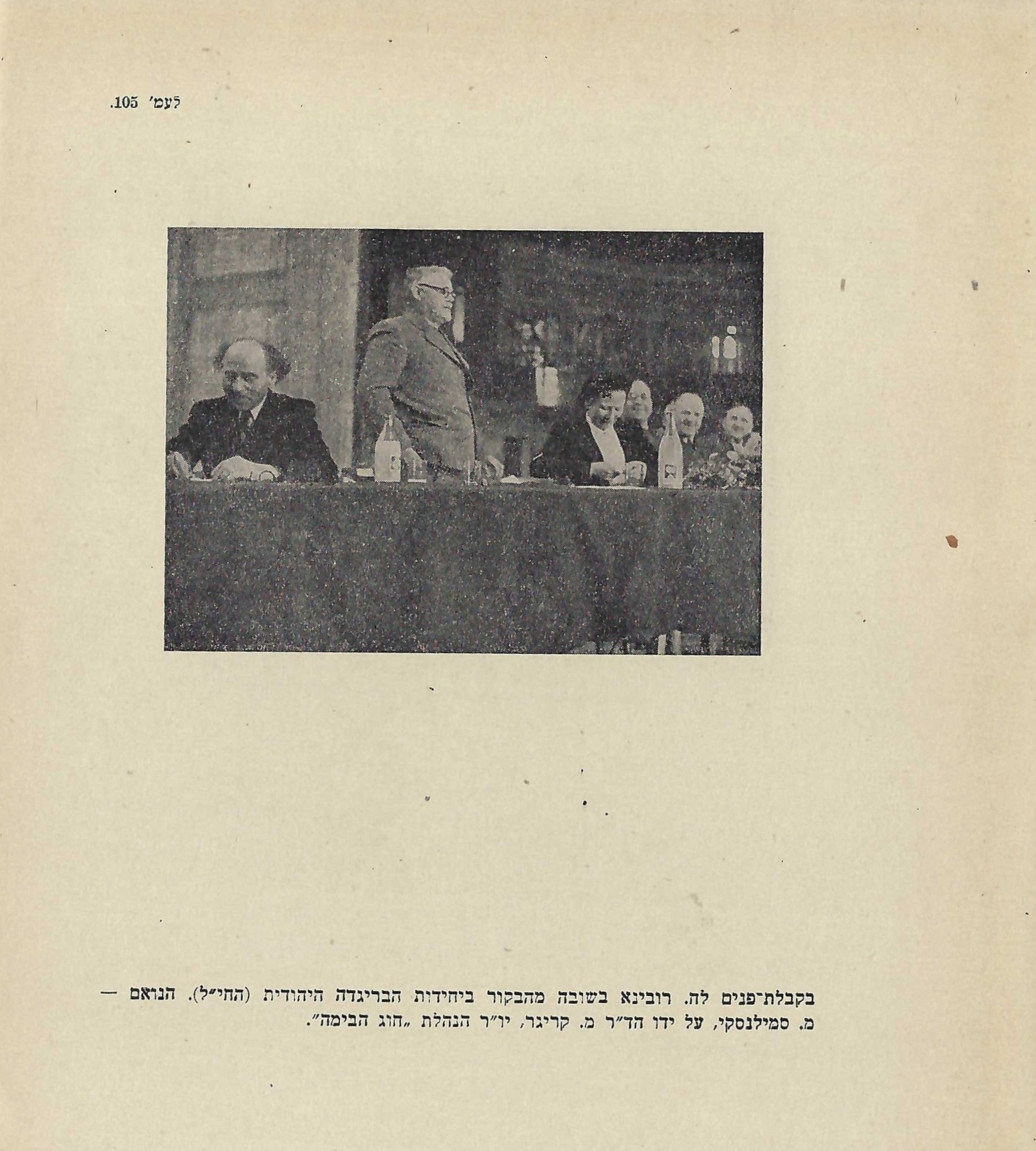
|
| Hanna Rovina meets the troops Egypt 1944. | Hanna Rovina welcomed back home by Moshe Smilansky (MBE) and Dr. Moshe Krieger. |
Back at the Habima theater and the inauguration ceremony, in 1945, Habimah handed out a bi-lingual pamphlet, Hebrew-English, published by the Jubilee Committee of the Habima Theater, with a wealth of information on Habimah that included a potted history of Habima (see photo) In addition another book was published for the general public, entitled "Habima at 25", by Gershon Hanoch (Hebrew only), 1946. 250 pages.
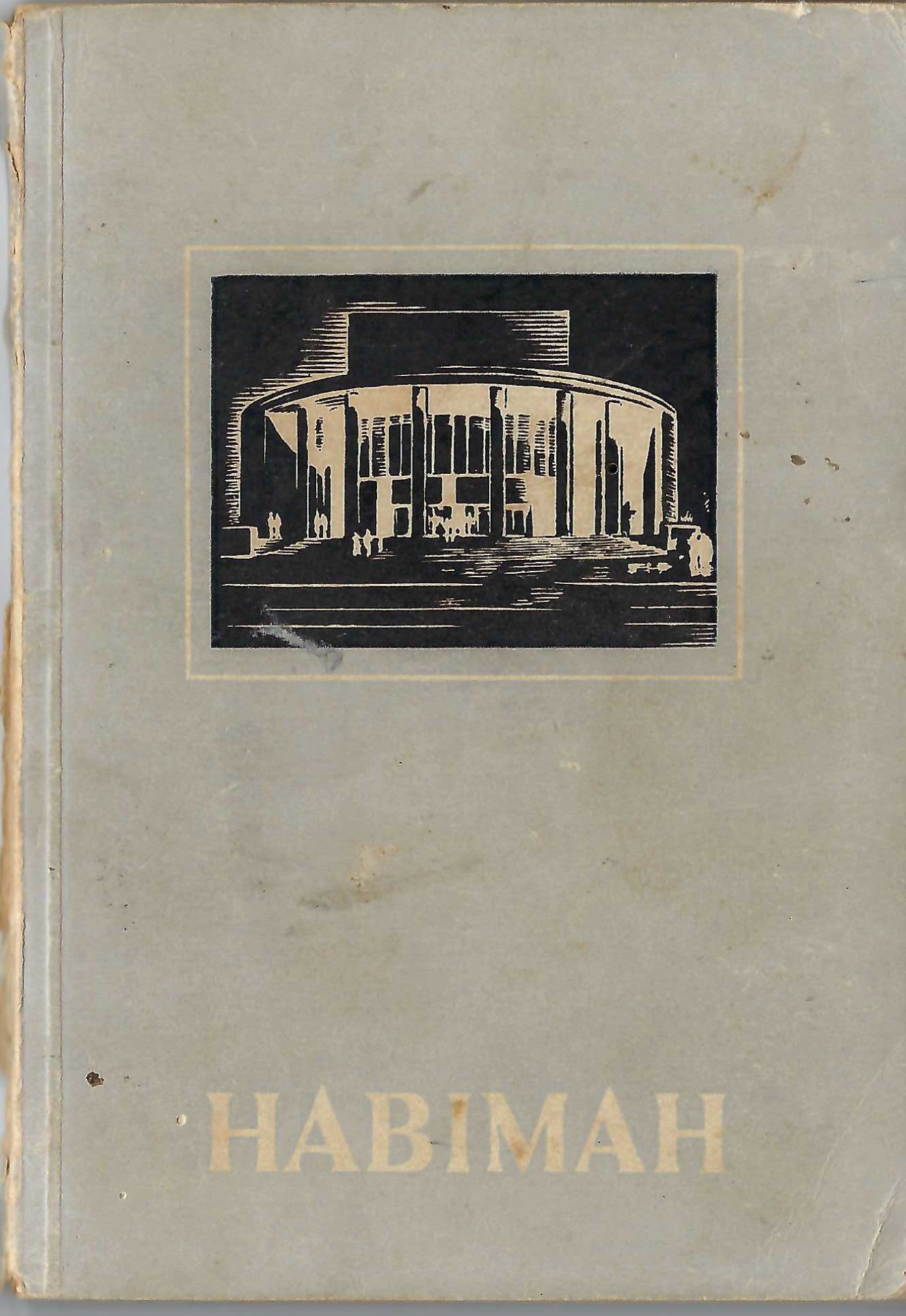
|
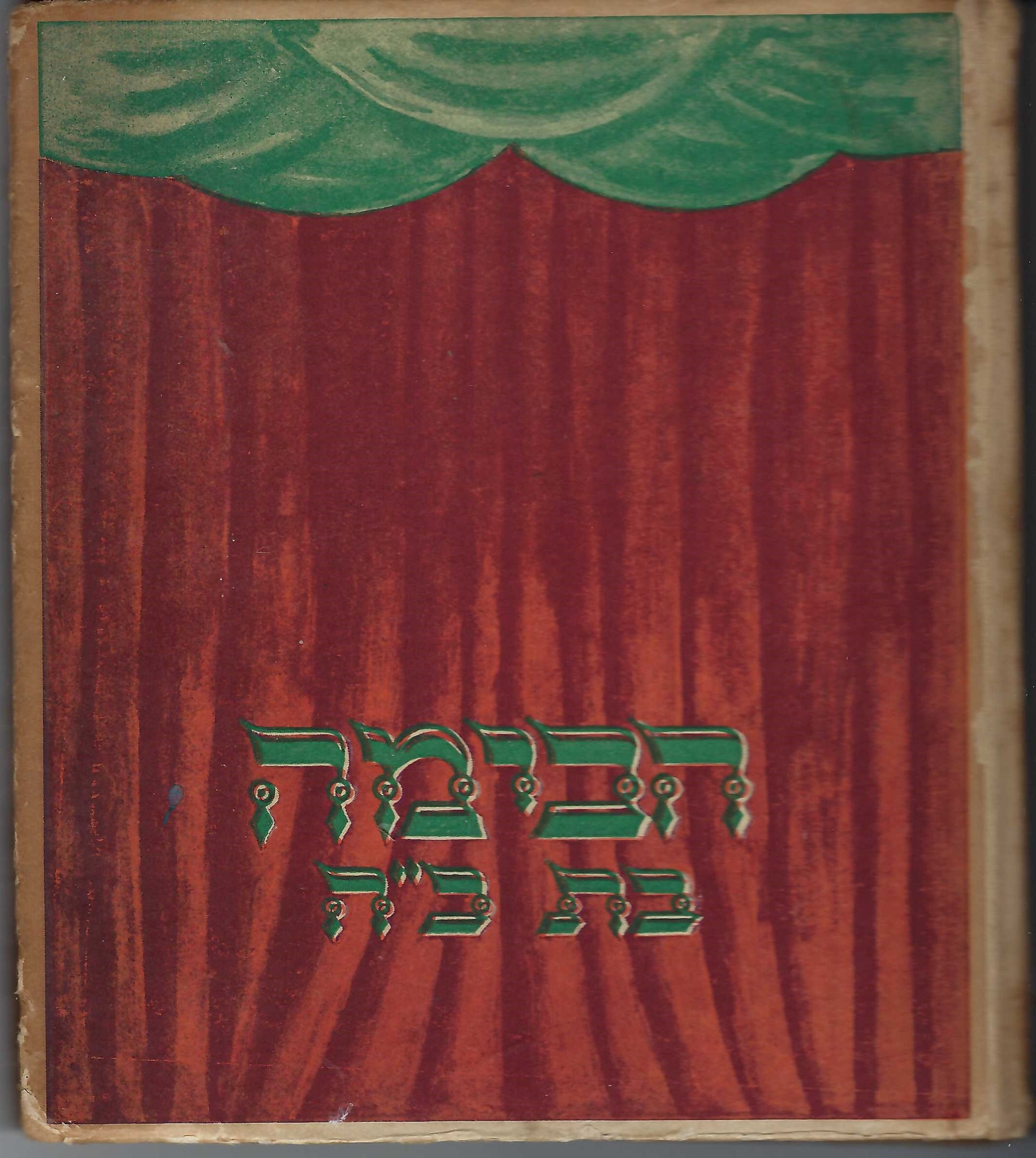
|
| Bi-lingual pamphlet, Hebrew-English, published by the Jubilee Committee of the Habima Theater | Habima at 25, by Gershon Hanoch (Hebrew only), 1946 |
The jubilee book includes a who's who in the Jubilee Committee. First and foremost, the names listed are of the honorary presidents of the Habima Jubilee Committe, such as Albert Einstein; Chaim Weizmann; David Ben-Gurion; Moshe Smilansky,writer; Jacob Fichman, poet and literary critic ; I. Rokach (the fourth mayor of Tel Aviv, Nov 1936 till 1953); David Remez (Head of Solel Boneh, the National Construction Company, and General Secretary of the Histadrut - Labour Federation), Arieh Shenkar (founder of the Manufacturers Association of Israel - formerly Industrialists' Union in Palestine(Eretz Yisrael) - and a pioneer in the Israeli textile industry).
Following that list is a list of the members of Habima Jubilee Committee, a who's who of the Yishuv's cultural life in general. Names associated with the PBS, for example , include, H. Samuel - . I assume that this is not Herbert Samuel, the former British High Commissioner on Palestine, but Hadassah Samuel, the wife of Edwin Samuel, Director of the PBS, 1945-1948. Edwin Samuel of course was the son of Herbert Samuel. Other significant members of the Habima Jubilee Committee connected with the PBS were: I. Klinov; A. Katznelson; Dr. M. Soloveichick; and Martin Buber; to name just four. Professionally they covered the highest political, social educational, and cultural institutions in the Yishuv at that time, not just the theatre world. This included, among many others, the Vaad Leumi, the Jewish Agency, Academia (Hebrew University), and Journalism (Haaretz).
In more detail:
I. Klinov, I assume, this is Isaiah, or in Hebrew, Yeshayahu Klinov. Klinov at that time was the Director of the Jewish Agency Information Department. He also wrote and presented a 15 minute weekly radio talks, in Hebrew, for the PBS, entitled "In the Diaspora" (Mashot Olameinu) My translation of this could be something like "Roving our World" but you get the idea. He also wrote regularly for Hagalgal magazine, some articles being transcripts from his broadcasts.
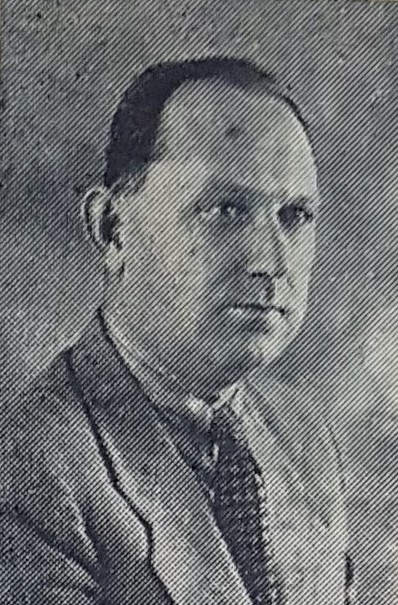
|
| Yeshayahu Klinov |
Avraham Katznelson, later known as Avraham Nissan, was, between 1931 and 1948, director of the Health Department of Vaad Leumi, the Jewish National Council (JNC) (equivalent to the government/Knesset today). Katznelson also represented the Vaad Leumi at the inauguration ceremony of the PBS in 1936, giving a speech, at that ceremony. (see: http://virlib.brinkster.net/.../Speech_Avraham_Katznelson...).
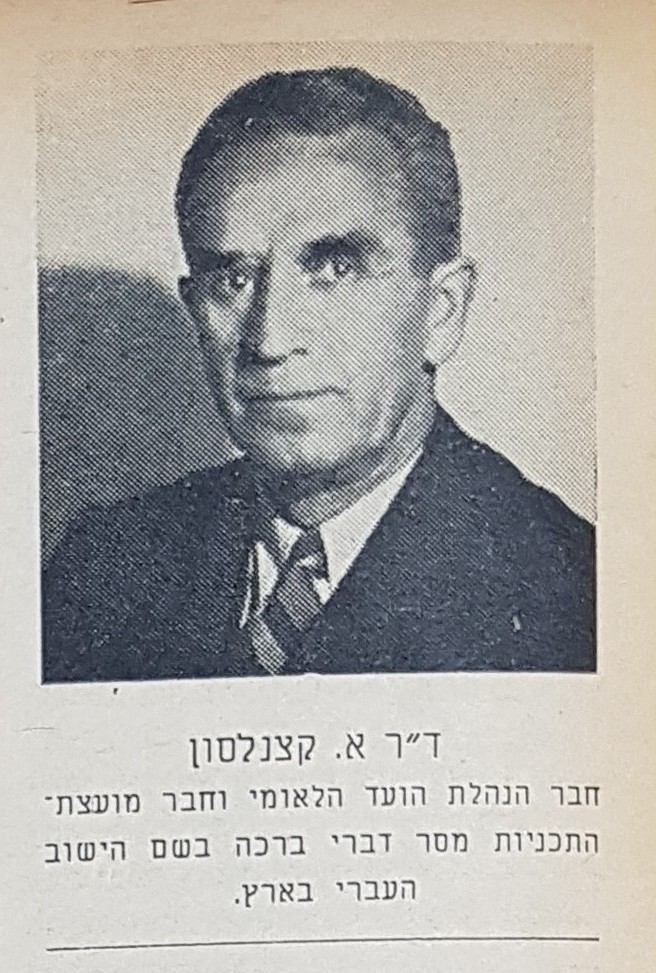
|
| Avraham Katznelson |
David Ben-Gurion and his wife Paula were invited guest to the inauguration ceremony - 30 March 1936. They both came, although perhaps not totally surprisingly Ben-Gurion was not given any official capacity in the ceremony itself.
Dr. Mordechai Soloveichick was the Education Director of the Vaad Leumi (Jewish National Council). He was very involved in the early days in cooperating with the PBS especially in its programs broadcasted to schools such as the series of broadcasts called "Hasket V'Haskel" ("Listen and Learn"), 1941-1948. With the establishment of the State of Israel he was appointed the first director of Kol Yisrael Broadcasting Service. By then the public diplomacy side of the radio had completely evaporated, he was not popular with the new staff and left shortly afterwards.
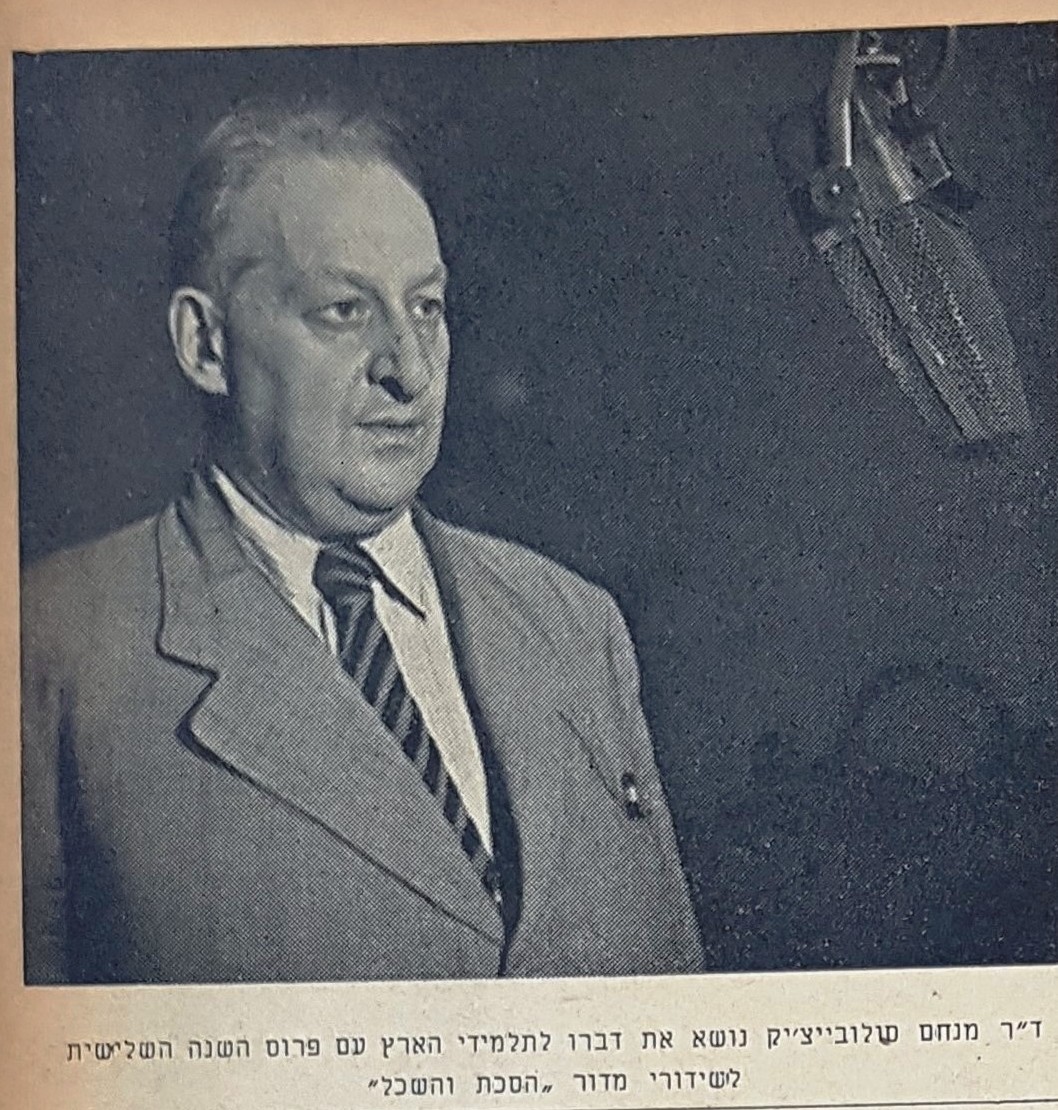
|
| Menachem Soloveichik |
Lastly in this short list, Martin Buber: Philosopher, lecturer at Hebrew University.
The Habima theater group was probably one of the most important of the Hebrew theaters in the Yishuv at that time - it took its repertoire to various towns throughout the country, bringing culture to all the nooks and crannies, including the kibbutz movement .
Repertoire a select list.
(for the full list is in the pamphlet see photos attached)
Play #8: David's Crown, by Pedro Calderon de la Barca (Spanish, 1600-1681). Premiere: May 23, 1929
Play #9: Twelfth Night, by William Shakespeare (English, 1564-1616)
Play #11: The Devil's Disciple, by Bernard Shaw (Irish, 1856-1950 ). Premiere:
Play #12: The Sacred Flame, by W. Somerset Maugham (English, 1864-1965)
Play #24 Wolves, by Romain Rolland (French, 1866-1944)
Play #26 The Imaginary Invalid, by Molliere (French, )
Play #28: Revisor, by N. Gogol
Play #33: Loyalties, by John Galsworthy (English, 1867-1933)
Play #34: Love on the Dole, by Ronald Gow ( English playwright, 1897-1993)
and Walter Greenwood (English novelist, 1903-1974)
Play #35: The Merchant of Venice, by William Shakespeare
Play #41: Bury the Dead, by Irwin Shaw (American, 1913-1984)
Play #43: The White Plague, by Karel Kapek (Czech 1890-1938)
Play #46: The Cherry Orchard, by A. Chekhov
Play #50: The Mother, by Karl Kapek
Play #52: The Pillars of Society, H. Ibsen
Play #55: My Son the Minister, by Andre Birabeau (French, 1890-1974)
Play #56: Man and the Devil, Jacob Gordin (Russian-American/Yiddish, 1853-1909)
Play #66: Crime and Punishment, by Dostoyevsky
Play #68: The Morning Star, by Emlyn Williams (Welsh, 1905-1987)
Play #74: Phaedra, by Jean Racine (French, 1639-1699)
Play #75: The Suitors, by N. Gogol
From this list alone it was clear that Habima was not just a "local theatre" with a repertoire of local talent. It was a national theater with an international repertoire from the outset.
These plays do not just happen out of the air finding its way into Habima very intensive repertoire by chance. Someone had to translate the plays into Hebrew. A budget was needed. Where did that come from in such a poor country, in fact, a country- in-waiting? Private donors/philanthropists? Possibly. But most likely the mandatory government and public diplomatic efforts played its part too.
Near the end of Gershon Hanoch's book "Habima at 25" , we get further interesting information on the repertoire. Here we find that Shaul (Saul) Tchernichovsky translated "Twelfth Night", by William Shakespeare into Hebrew. Tchernichovsky also translated "The Devil's Disciple" by George Bernard Shaw and "The Imaginary Invalid", by Moliere (le malade imaginaire).Did he use the English version or the original French version? Further research is needed here, but I have almost no doubt that the British mandatory authorities had a hand in getting the British and Western components into the repertoire. Who else would have an interest in translating and performing Shakespeare, John Galsworthy, W. Somerset Maugham, George Bernard Shaw, and Emlyn Williams. This was clearly a job for public diplomacy.
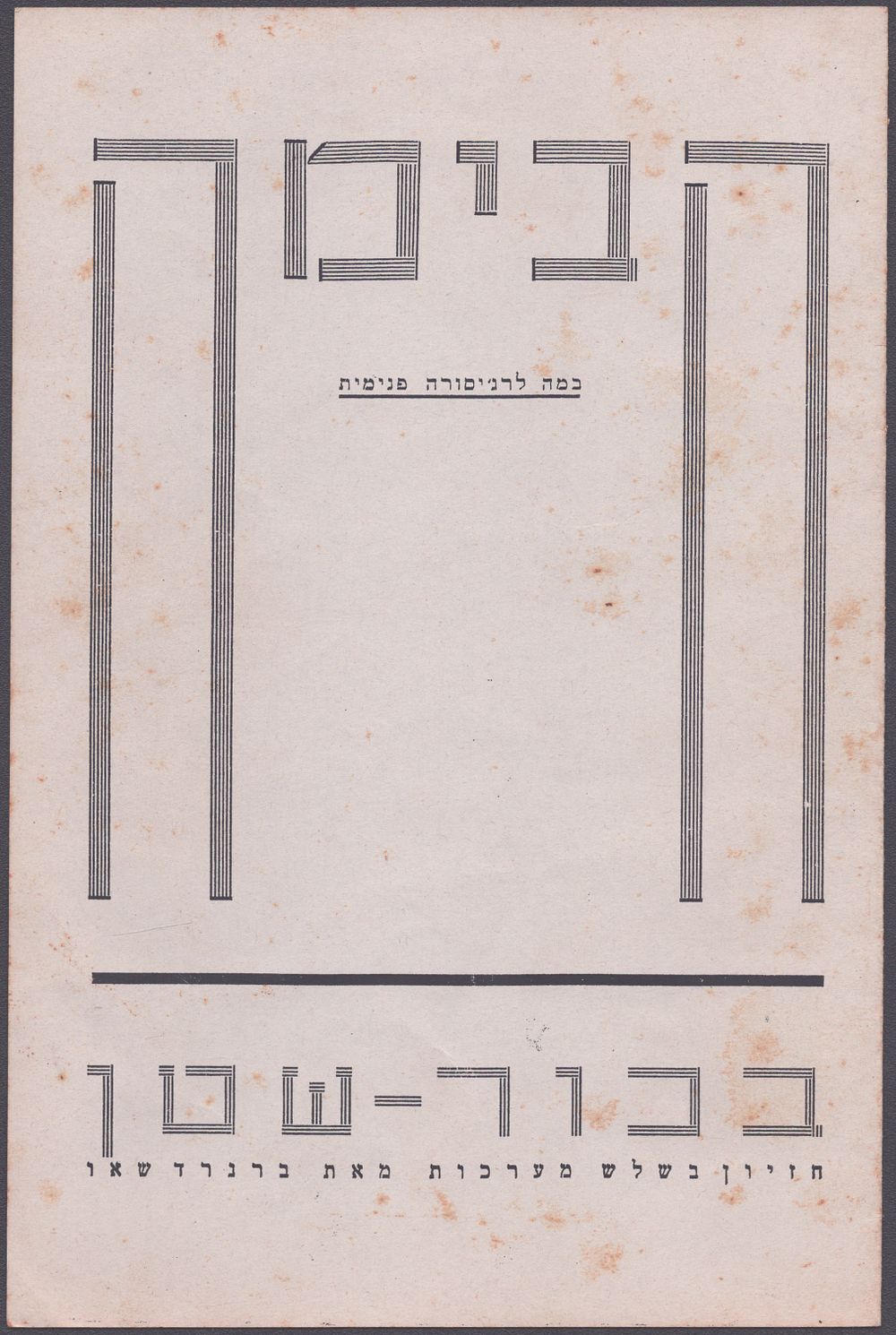
|
| Habima's program for the Devil's Disciple, by George Bernard Shaw. |
Palestine Broadcasting Service (PBS) and Habima Theater
While it is well documented that the Habima, the National Theater of Israel, had its opening ceremony of the new building in Tel Aviv, on September 30, 1945. It's not that well known that the PBS had sent out a crew was out there doing one of its outside broadcasts at the ceremony itself. Habima's archives preserved the tape and have given the public a short clip of the ceremony itself.
What you hear in the clip is Ruth Shapiro introducing the ceremony from the studio, and Mordechai Zlotnik, commentating on the ceremony from the Habima theater itself. One of the few rare examples where we hear what Ruth Shapiro and Mordechai Zlotnik's sounded like in the radio.
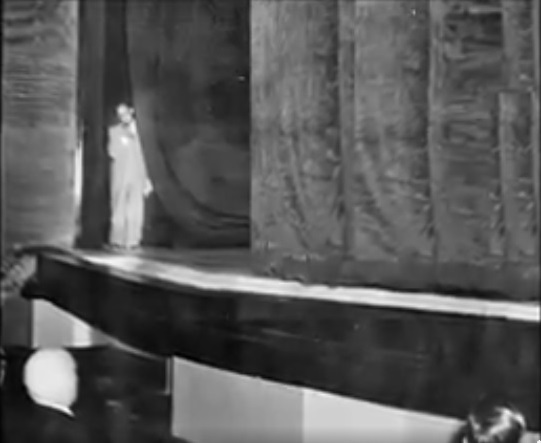
|

|
| Photo of Mordechai Zlotnik peeking out from the curtains on the left hand side of the stage. | Ruth Shapiro |
The video put out with the audio recording shows the photo of Zlotnik peeking out from the curtains on the left hand side of the stage.
The Palestine Post of that day just includes the radio schedule, nothing too significant beyond that. No articles noting the event:
8:25: Bible Reading.
8:30 Habima in its new home.
9:15 Open Air Concert at Zichron Yaakov.
One of the main speakers, representing the actors is
Palestine Broadcasting Service (PBS) Public Diplomacy and Theatre: Part 2: Hamatate ("The Broom") Satirical Theatre and "The King of Lampadusa .
There is no shortage of material online on the Hamatate Satirical Theater, 1928-1954. But somehow it gives a very distorted angle on the British mandatory period in Palestine.The impression is that the theatre company poked fun at the British authorities whenever it could. The fact is it while there is a grain of truth to this, the authorities took it in good spirit. My evidence? The PBS gave them a regular 30-minute monthly broadcast from 21 October 1945 to showcase the best of their live stage performances. Hagalgal magazine also had a couple of good articles on Hamatate theatre. Not something they would do if the thought it undermined their authority. Not something they did, for example, with a rival satirical theatre group "Li-La-Lo".
Hamatate's humor seems to be a bit like the british tv weekly satire "That was the week that was" affectionately known as TWTWTW or TW3 presented by David Frost, 1962-1963. While I have no written evidence to back me up, it was likely that both the director of PBS and deputy director, Edwin Samuel and Rex Keating, respectively, liked Hamatate's humor. Both had a very keen sense of humor themselves. In 1938 and 1939, Edwin Samuel presented a series of lectures on the PBS, based on a fictitious organization called Brighter English. Most people tuned to hear the "president" of this organization who was unnamed and mysterious and who constantly poked fun at British "red tape", the bureaucracy, while simultaneously teaching English and British culture.
Hamatate would always end their radio broadcasts with a song on what was good and what was bad about the yishuv. The lyrics changed for each broadcast, it was always updated for the next broadcast (see video attached from Jerusalem cinemateque).
Nothing escaped the British censors so it was most likely that Samuel who himself had worked as a censor before promotion to director of the PBS approved the script of all the performances in advance. Samuel also knew Hebrew, so it would have been very difficult to get one passed him.
So perhaps it should come as no surprise that Hamatate put on a special performance of the play "The King of Lampedusa". More on that later. However, after independence, the new Israeli authorities did not share in this sense of humor being poked against its own institutions now that it was in power. Hamatate closed its doors in 1954.
Photos, articles from Hagalgal magazine and video on "Hamatate" to follow. =====================
The King of Lampeduse: a Three-Act Play, by Samuel Charendorf
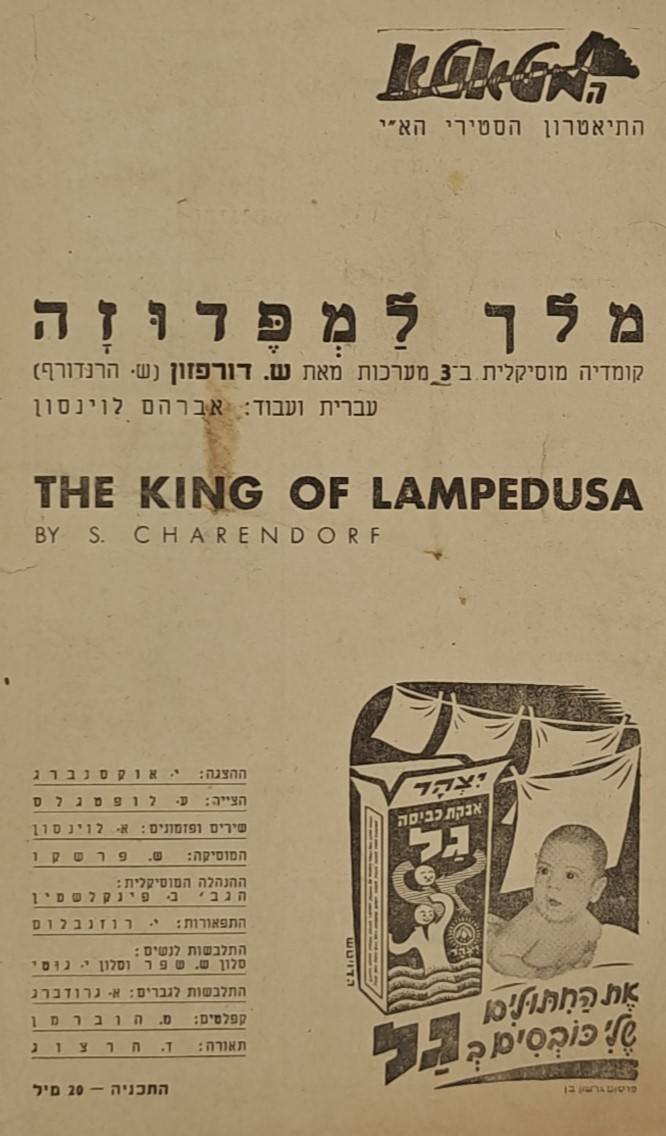
|
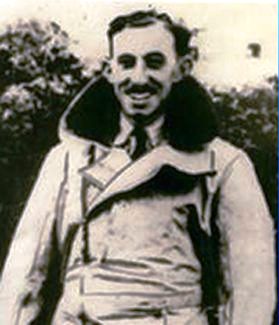
|
| Habima Program : King of Lampedusa | R.A.F. Flight Sargeant Sydney Cohen |
The King of Lampeduse, the play, was based on a true yet quirky story of World War 2. RAF flight Sargeant Sydney Cohen was pilot of a Fairey Swordfish, a bi-plane, based in Malta. He was on a search and rescue mission when his aircraft got into trouble. Running out of fuel he made an emergency landing onthe Italian island of Lampedusa, between Tunisia and Malta. He knew he was in enemy territory, but had no alternative other than to surrender They all got down from the plane ready to surrender, when suddenly out of nowhere it seemed, appeared 4,300 Italian troops offering to surrender. They had been bombarded for days and nights, by the British and American air force, unknown to Sydney Cohen, with the idea to use use this Island as a jumping off point for the invasion of Italy, via Sicily. The Islanders and Italian troops were out of food and water and at nerves end. They surrendered to Sydney Cohen, a 21 year old tailor from the East End of London, in civilian life. When the papers heard the story, he became a hero overnight. The newspapers called him "The King of Lampedusa"
This was the stuff they needed to boost the moral at the home front A Jewish writer and playwright living in London at that time, Samuel J. Charendorf, read the story and immediately thought to turn it into a Yiddish play and production, 'The King of Lampedusa', (Der kenig fun lampeduse / דער קעניג פֿון לאַמפּעדוסע) which became a hit musical at the Grand Palais Yiddish Theatre in London's East End.
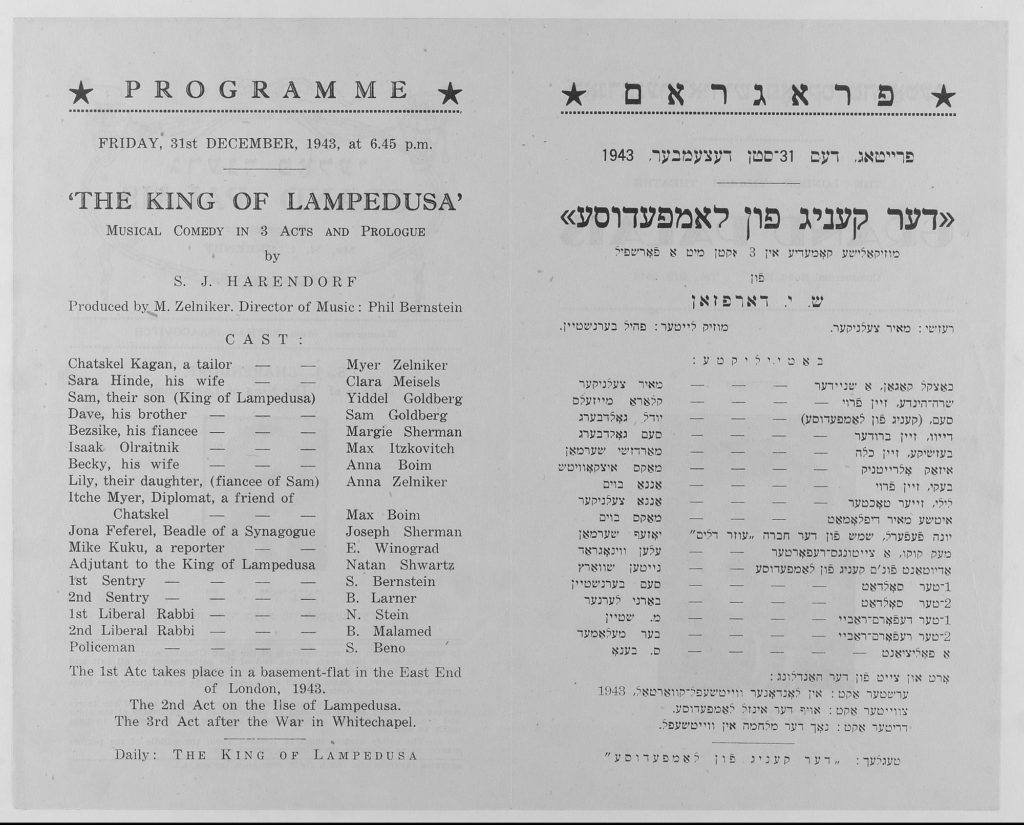
|
| Program from King of Lampedusa, Grand Palais Yiddish Theatre in London's East End. |
The play debuted on 31 December 1943. The play attracted the attention of 'Lord Haw-Haw' in Germany who threatened the theatre as the next target of the German Luftwaffe. It went on to enjoy the longest run of any production in Yiddish in London, being performed over 200 times. The cast also recorded an English adaptation which was broadcast by the BBC in 1944, starring British actor Sydney Tafler.
It was then translated into Hebrew by Avraham Levinson and produced for the Hamatate Satirical Theater Group. Premiered November 14, 1944.
It was reviewed in Hagalgal magazine, Vol 2, Issue No. 12, p 16 (December 7, 1944) by a Samuel M. C. (surely not Samuel Charendorf, the original author?) His middle initial differs "M" not "J", but... could that just be a red herring? Why hide behind an abbreviated name for this review. I wonder?
Bottom line the "Hamatate" theatre were all there with the British authorities and this spotlights the ambivalent nature of the local residents towards the British authorities and not quite the way the official narrative lets us to believe.
Palestine Broadcasting Service, Public Diplomacy and Theatre: Li-La-Lo
Li-La-Lo was established only in 1944. It put on what it called "revues", song and dance routines etc., rather than being purely satirical theatre like HaMatateh ("The Broom"). Think Black and White Minstrel show or similar.The Palestine Broadcasting Service hardly bothered to do outreach to Li-La-Lo itself. Only twice did they broadcast the best of their programs over the air, and that was semingly based on recordings. There could have been many reasons for this. Li-La-Lo, unlike Habima or Hamatateh was much more focused on local themes rather than national/international themes as such. In one sense that should have been a good reason why the PBS would try to get a handle on them. However, the PBS didn't have to be associated directly with Li-La-Lo as they already developed close contacts with their personnel. They were in touch with Li-La-Lo's star performer, Yemenite singer Shoshana Damari, since 1938, when she broadcast for PBS Hebrew programs, Wednesday, August 24, 1938:
8:20 pm - 8:35 pm: Shoshana Damari with accompaniment of 'Oud and Drums. Yemenite Songs by Shabazi.
8:45 pm - 9:00 pm: Shoshana Damari with accompaniment of 'Oud and Drums. Palestinian Folksongs. She was only 15 years old at the time.
PBS also had contact with at least one of the regular poets/playwrights, Nathan Alterman. Fast forward to 1945. There were two dates that Li-La-Lo appeared on the air with the PBS each with selections of the best of Li-La-Lo's new revue programs:
September 20, 1945: a performance of "Interview at Li-La-Lo" highlights of the best of their programs, including recordings by the PBS and :
November 1, 1945: a performance of their latest revue entitled "Unconditional Laughter." Shoshanah Damari appeared in both programs and singing what was to become one of her most famous songs "Kalanioth" (poppies/anemones). Poppies having a particular somber meaning in the British culture as representing a memorial of the fallen soldiers of Flanders, the Somme. etc., of the Great War of 1914-1918.
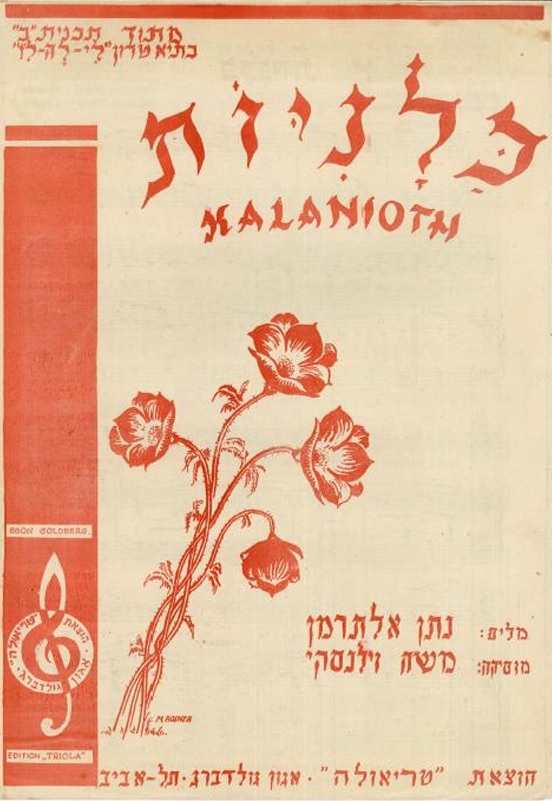
|
| Kalaniot, Sung by Shoshanah Damari |
There is no recordings of Li-La-Lo that I know of, here is a slightly later version, for atmospherics:
https://www.zemereshet.co.il/player/mobile_wide.asp... Another musical star from Li-La-Lo was Clara Imas who was well-known for whistling tunes rather than singing. Jerusalem Cinemateque archives has a film with Clara Imas playing Doina Romanian Folksong on piano and whistling (no sound!) Well it is a movie archive and sound is not so important, right? better a silent vdeo than nothing I suppose:
One revue that got a relatively good review included a love song by a "milkmaid", day dreaming of leaving the rural life of Kfar-Sava for the glittering town life, leaving behind the fields, the milking of cows. She is requesting permission from her parents to marry the boy of her dreams, Bennie. The song was written by poet/playwright Nathan Alterman, music by Moshe Vilenski and sung by Mina Bern.
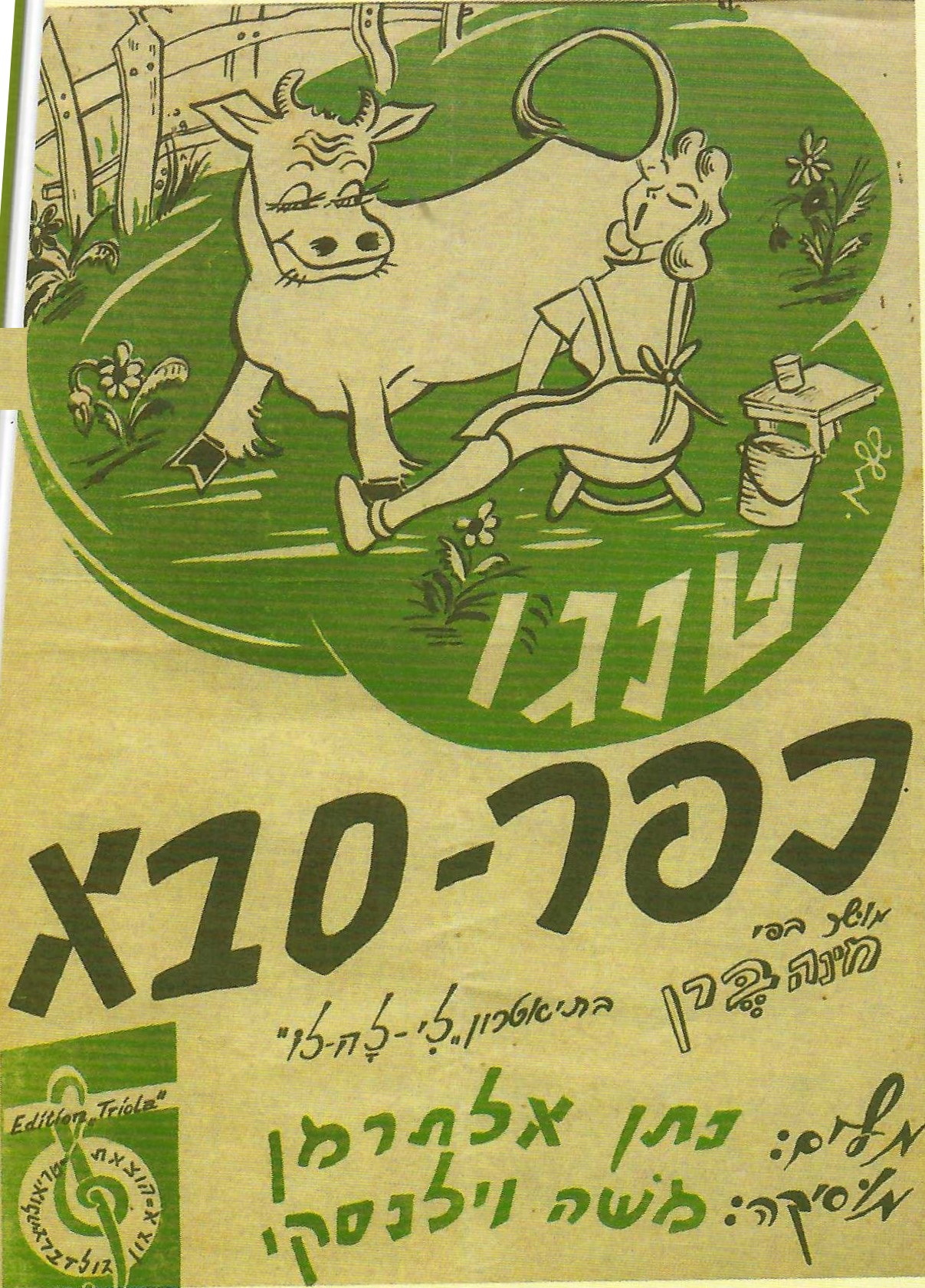
|
| Tango Kfar Sava |
There are not too many love songs that include the very romantic expression such as "foot and mouth disease", but Alterman managed to get it in there. Sigh! Parallel to the disease that was prevalent at that time (July 1946 ) she declared her love for Bennie including, the naughty erotic bit to kiss Bennie's mouth down to his feet!!! I mean, clearly romance was not dead in the Yishuv of British Mandatory Palestine. Palestine Post July 14, 1946 wrote:
"...Mina Bern made an attractive village milkmaid pining for the big city against the striking background of a lively cow." You can't get more romantic than that now can you? See music sheet cover. Today that song is remembered fondly in Kfar-Sava as "Tango Kfar- Sava". You can find the early original 1946 recording in Youtube here: https://youtu.be/iIy9ragq-R0?si=hu_ci9YQ7FiZx5Zh Incase you don't get it, this song should not be taken too seriously. Or maybe I just don't understand love songs. Bottom Line: There isn't too much evidence that the PBS had much to do with Li-La-Lo by way of public diplomacy. Coming next: Palestine Broadcasting Service (PBS), Public Diplomacy (PD) and and the Ohel Theatre group.
Palestine Broadcasting Service (PBS) Public Diplomacy (PD) and the Theatre: OHEL ("The Tent") Theatre
We looked at Habima Theatre, then Hamatateh "The Broom" Theatre, Now there was a third major theatre group in Palestine during the British Mandatory period: "Ohel" Theatre Ohel Theatre more politically socialist in orientation than all the others, and from its birth in 1925. It was originally known as the "Workers' Theatre of Palestine" with members of the cast combining (as Wikipedia tells us) acting with farming and industrial labor. It was even organized as a collective, an urban kibbutz, if you like.Wikipedia tells us also that it staged biblical, historical and national plays. Then Wikipedia tells us that after a tour of Europe - - they went to Poland and Soviet Union - on returning to Palestine - it produced "The Good Soldier Schweik (1935). Wikipedia mentions the fact that it was the official theatre of the Histadrut, the General Labor Federation, until 1958. Then Wikipedia jumps to 1968. The Ohel theatre survives longer than the other smaller theatre groups, but in the end closed down in 1969.
If Wikipedia is your starting point, Wikipedia basically follows the general narrative, so on the face of it there isn't much room for any public diplomacy program. After all, the PBS was told from day one that it had to stay clear of local politics, whatever that meant. I would suggest it just meant they were to be be inclusive and not exclusive to any one political group or party, such as the Histadrut and Mapai or Mapam Political parties. There was plenty room to make contacts with all these groups without being seen as supporting exclusively the ideas of any one political party or ideology. So socialism was the name of the narrative. Capitalism was pretty much a four letter word.
However, the word, capitalism, wasn't exactly a dirty word in Britain during the Mandatory period,. True. Britain was very class-oriented. Almost everything was class based: the press, sports, humor, theatre, name it. Movies about the British in Palestine always seem to show that they were all upper-class stereotypes showing total disregard to working class anything. That might have been the case for some officers, but there were many Scots in Palestine particularly in the PBS , such as Crawford B. McNair, director of programs, for one, who didn't seem to care to change his accent to the BBC's or King's English pronunciation, from all accounts. Britain was also proud of its liberal and socialist history. Writers like George Orwell, who seemed to have been a favorite writer of Berl Katznelson, editor of Davar newspaper and Am-Oved book publishers, and playwright, George Bernard Shaw (GBS) just to name two examples, were popular in Palestine. GBS came over to visit Palestine was a guest of Edwin Samuel. Edwin, the son of Herbert Samuel, was later to become the director of the PBS (from 1945-1948).
Among Ohel's translators you'll also find a few familiar names, and familiar to the PBS as well: Nathan Alterman, Leah Goldberg and Avraham Shlonsky. Add the fact that the founder of the Ohel theatre, Moshe Halevy, had also been a founding member of Habimah, back in the Moscow years and you get that there is room for PBS to do some soft-diplomacy (if only they had known the term back then). If you look at some of the plays that were put on during the mandatory period I think you will see that someone is pushing British and American culture into their repertoire:
- King Lear, by William Shakespeare: Premiere June 3, 1941. The first Shakespearean play in Hebrew of the Ohel Worker's Theatre, translated into Hebrew by Avraham Shlonsky. The title role was performed on the first night by the founder/director, Moshe Halevy. "This was his first stage appearance after 15 years of work as stage manager." Palestine Post June 5, 1941. In alternate performances the title role was performed by Simcha Chekhoval. (only two other Shakespearean plays had been translated into Hebrew at that time, "Twelfth Night" and " The Merchant of Venice" both for Habimah.
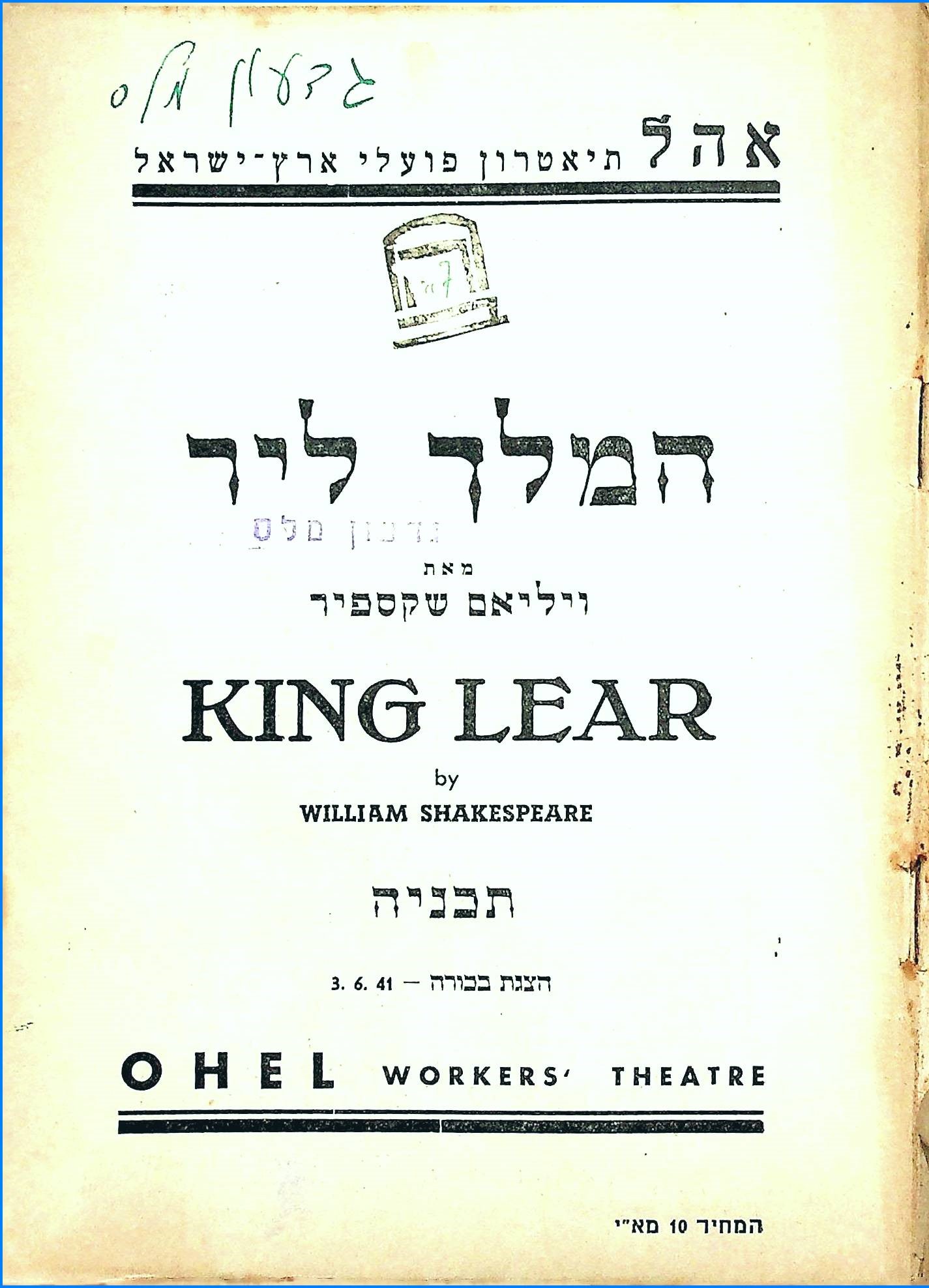
|
| King Lear, by William Shakespeare |
An interesting aside: King Lear had just been performed in Arabic, January 1941, by the National Dramatic Group. "King Lear was presented in Arabic for the first time in Palestine at the YMCA auditorium, in Jerusalem, last night in a performance which brought on the stage many of the actors known to some listeners from plays broadcast over the PBS. Azziz Eid, who produced the play, also took the title role and gave a remarkable performance. All the players rose to the occasion, but several honours go to Azziz Eid, Mlle Georgette Wasili as Cordelia, Musa Salami as the Duke of Gloucester ..." Listeners Corner, Palestine Post , January 5, 1941.
- The Doctor's Dilemma, by George Bernard Shaw: Premiere October 20, 1945. (הרופא על פרשת דרכים) translated into Hebrew by Menashe Levin.
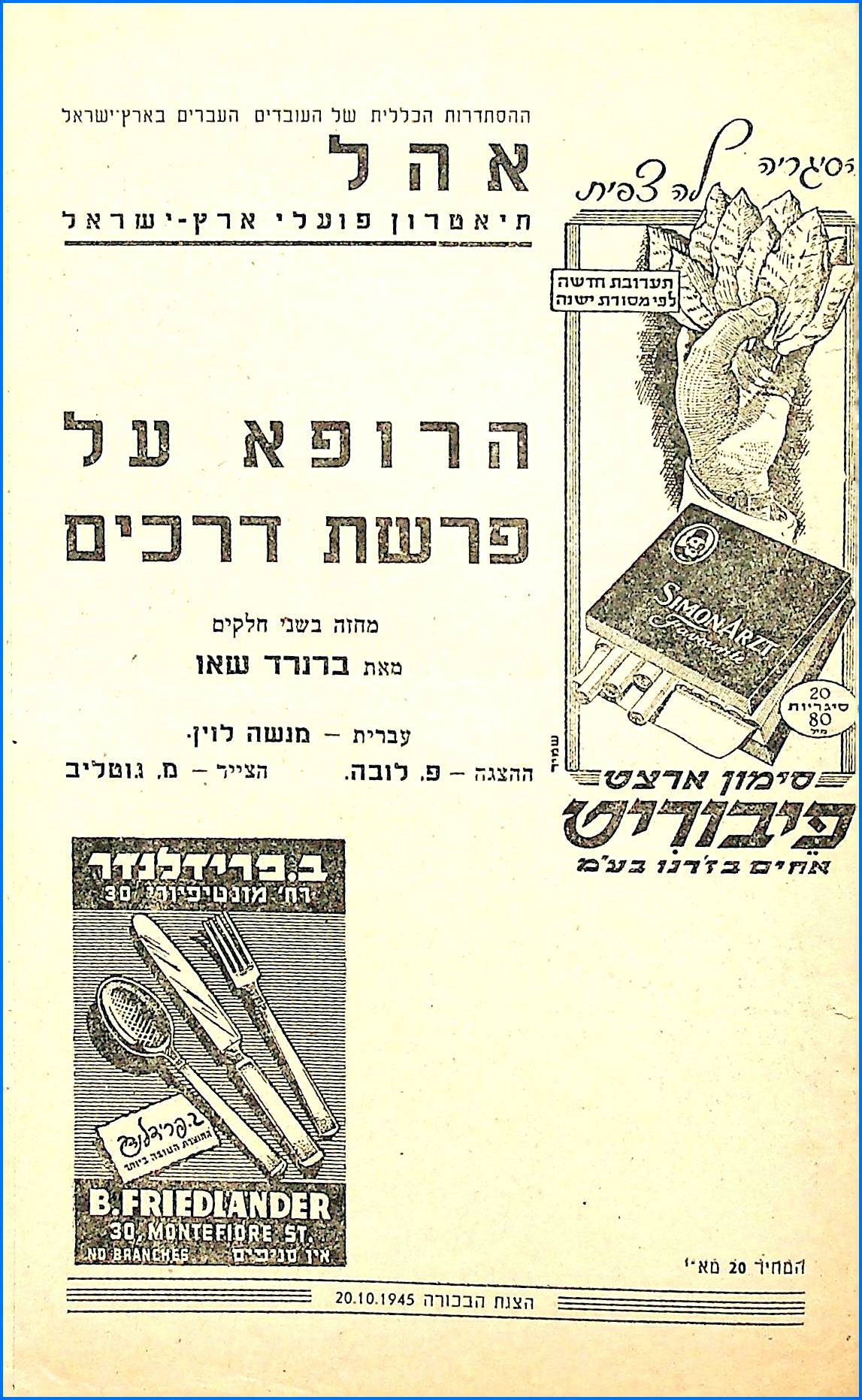
|
| The Doctor's Dilemma, by George Bernard Shaw |
- Street Scene, by Elmer Rice, 1947. This is one of the more intriguing plays. Elmer Rice was an Jewish-American playwright. The photo of the stage setting in Hagalgal , Volume 5, No. 33, page 8 (11 March 1948), immediately brings to mind "West-Side Story".
Not totally impossible for the fact that Leonard Bernstein had visited Palestine, May 1947. But unless he was time-traveling West Side story was written and became a Broadway production in 1957, set in New York of the mid-1950's . The Hebrew title could cause some confusion . It wasn't called Street Scene, but "בפרברי ניו יורק"
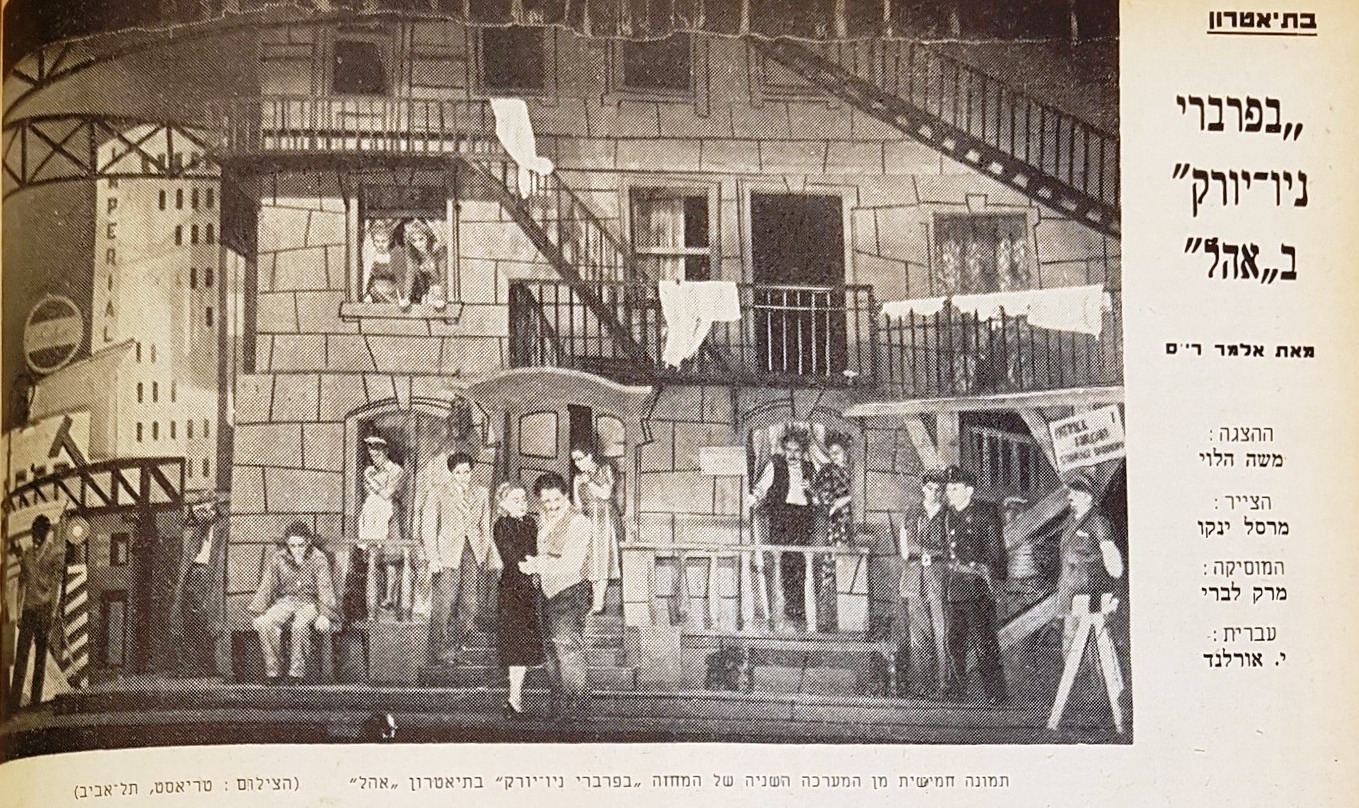
|
|
Street Scene, by Elmer Rice. Habima Theater, January 1948 Production by Moshe Halevi Scenery by Marcel Janco Music by Marc Lavry Translation into Hebrew by Ya'acov Orland |
"In the Suburbs of New York" Particularly confusing as Rice had a second play , an unproduced play with a similar title , "The sidewalks of New York" (1925) which was a play without words "in which speech is indicated by gesture, by a series of situations in which there was no need for speech." (From Rice's autobiography ,Wikipedia) I can only wonder what that play would look like. I mean, how many pages would it take to have a play without words. Way ahead of his time. Watch this spot.